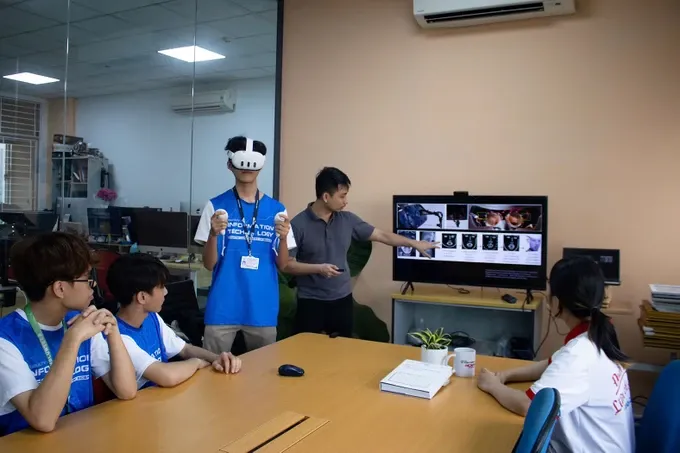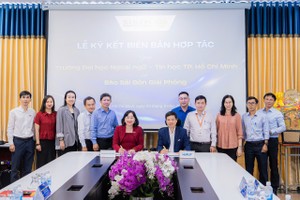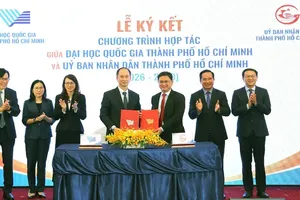
Starting in 2025, universities in Ho Chi Minh City will initiate the enrollment and training of international-level professionals across eight disciplines: Information Technology and Communications, Mechanics and Automation, Artificial Intelligence (AI), Business Administration, Finance and Banking, Healthcare, Tourism, and Urban Management tailored for Ho Chi Minh City.
Professor Ngo Thi Phuong Lan, the Principal of the University of Social Sciences and Humanities (Ho Chi Minh City National University), which oversees the Urban Management program, stated that the training will be conducted in two phases, each featuring distinct enrollment procedures and tuition structures. In the initial pilot phase, the program will select 20-25 high-performing students from the existing Urban Studies major (specifically third-year students) to participate in the Urban Management training.
Starting in 2025, the program will begin enrolling students in a traditional format, initially accommodating 40 to 60 students annually during the first phase. This number is projected to increase gradually, aiming for a total of 120 students by the fourth year. The program features a flexible enrollment system that not only maintains high training standards but also provides students with the chance to engage in an educational environment that aligns with international benchmarks.
In developing the AI training program, the University of Sciences (HCMC National University) proposes to adopt output standards and training program frameworks that are benchmarked against leading AI and data science programs at both regional and international universities.
A key objective of this program is to cultivate a cohort of internationally competitive human resources with advanced knowledge and skills in AI-related fields. To achieve this, the program prioritizes the development of strong English language proficiency and fosters a strong emphasis on international exchange, cooperation, and integration.
Educational institutions are developing programs like Finance - Banking, Information Technology - Communications, and Automation Engineering with the overarching aim of blending theoretical knowledge with practical application. These programs are designed to cultivate essential skills and enhance professional competencies, enabling students to fulfill international job standards and seamlessly transition into the workforce. The curriculum adheres to international benchmarks and emphasizes foreign language proficiency, incorporating input from businesses and employers throughout the educational journey, including practical training and internships.
Speaking about the benefits of studying the school's program, Professor Ngo Thi Phuong Lan said that students graduating from the international-level Urban Management program are equipped with in-depth knowledge of urban management, urban planning, environmental management, urban economics, urban transport and sustainable development policies.
With comprehensive knowledge and skills, graduates have the opportunity to work at public service agencies of Ho Chi Minh City, including departments, agencies and sectors related to urban management, such as the Department of Construction, the Department of Planning and Architecture and urban development research centers. Graduates can also apply for jobs in private enterprises in the fields of real estate, urban infrastructure and planning consultancy, or participate in non-governmental and international organizations operating in urban management and sustainable development.
According to Professor Tran Le Quan, Principal of the University of Sciences under Vietnam National University - Ho Chi Minh City, the output standards for this program, as approved by the Ho Chi Minh City People's Committee, emphasize the employability of graduates. Specifically, the program aims to produce graduates who are highly sought-after by employers and capable of immediate employment upon completion of their studies. The successful placement of graduates in the workforce serves as a critical measure of the program's effectiveness.
The effectiveness of the international human resource training program in artificial intelligence will serve as a foundation for Ho Chi Minh City to meet its socio-economic objectives, particularly in advancing research and development initiatives for AI applications and realizing the vision of a smart city.
Professor Su Dinh Thanh, Director of the Ho Chi Minh City University of Economics, highlighted that for the program to be successfully executed, it is crucial for the Ho Chi Minh City People's Committee to prioritize collaboration with businesses and organizations in the finance and banking sectors throughout the training process.
Furthermore, companies have the opportunity to "commission" training, provide scholarships, engage in assessing the quality of trained personnel, and suggest modifications to the training curriculum.
The program contributes to preparing human resources for the successful construction of the Ho Chi Minh City International Finance Center. Therefore, when studying the program, students have many advantages in finding suitable jobs after graduation.
Chairman of the Ho Chi Minh City People's Committee Phan Van Mai emphasized the importance of effective collaboration among the three parties involved—government, educational institutions, and businesses—during the implementation phase. He highlighted that the quality of training must meet the established standards. Furthermore, he stressed that the training programs should align with international benchmarks and be closely connected to the real demands of companies and labor market participants.
Through the pilot training phase, agencies should conduct an evaluation of the implementation results to provide recommendations and propose adjustments to the content and implementation of projects in the 2025-2035 period.
























